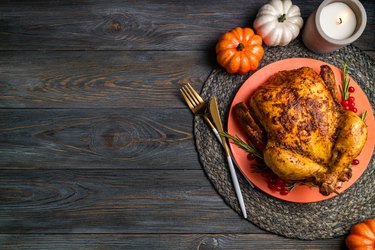
There's nothing like waking up to the smell of something delicious cooking. If you're planning to cook turkey overnight, here are some tips that can help, as well as some food safety recommendations to keep in mind.
The University of Minnesota describes a slow cooker as a convenient appliance that enables "all-day cooking without looking." In case you're wondering whether a slow cooker is safe, the USDA confirms that it is. In fact, a slow cooker uses less electricity than an oven and the low heat helps tenderize meat with less shrinkage, per the USDA.
Video of the Day
Video of the Day
Slow Cooking a Turkey at 200 Degrees
Follow these steps to slow cook turkey overnight:
- Cut the turkey into smaller pieces: The USDA suggests cutting up the turkey into either quarters or parts, such as wings, legs, thighs, breast, etc. before you cook it. All the parts should be completely thawed.
- Add spices and herbs for flavor: You can sprinkle some salt and pepper on the turkey pieces and stuff any cavities with herbs like rosemary and thyme for flavor.
- Add liquid to the cooker: The USDA suggests using water, broth or barbecue sauce. Follow the manufacturer's instructions to determine the quantity of the liquid you need to use.
- Slow cook the turkey at around 200 degrees Fahrenheit: The USDA recommends cooking the turkey on high heat for the first hour if possible and then switching over to low heat. If you're going to bed while cooking the turkey overnight, it is safe to use only the low heat setting. The temperature of the appliance with the slow cooking turkey should be between 170 to 200 degrees Fahrenheit throughout.
- Don't peek: The USDA says not to open the cover of the slow cooker while it's cooking since that lets the steam escape and brings down the temperature within the cooker, costing you 20 to 25 minutes of slow roasting turkey time.
- Make sure it's properly cooked: The innermost and thickest parts of the turkey pieces should reach 165 degrees Fahrenheit, per the USDA. The USDA notes that slow roasting turkey timings can vary. Factors that could affect the slow roasting turkey time include the type of cooker you have and the amount of turkey you're cooking.
Read more: How to Cook a 25-Pound Turkey
Turkey Nutrition Facts
If the idea of slow cooking turkey overnight is a little daunting, here's some motivation to help you get going.
According to the University of Illinois, turkey is a low-fat, high-protein food that also provides nutrients like B vitamins, potassium, phosphorus, iron and zinc. It is a type of white meat, which has a lower fat and calorie content than red meat. The exact calorie count and amount of fat and protein varies depending on the type of piece; however, pieces without the skin tend to have a lower fat and calorie content than pieces with the skin.
Read more: 7 Leftover Turkey Recipes to Be Thankful For
The journal Food & Nutrition Research published a study in June 2015 that found poultry consumption could help reduce your risk of developing heart disease, diabetes and cancer, as well as aid in weight management. Another study, published by the Journal of Human Nutrition and Dietetics in April 2013, also recognizes poultry as a significant source of nutrition and notes that it is the most widely consumed type of meat in the United States.
- University of Minnesota: “Slow Cookers and Food Safety”
- USDA: “Slow Cookers and Food Safety”
- USDA: “Turkey: Alternate Routes to the Table”
- University of Illinois: “Turkey for the Holidays”
- Food & Nutrition Research: “Role of Poultry Meat in a Balanced Diet Aimed at Maintaining Health and Wellbeing: An Italian Consensus Document”
- Journal of Human Nutrition and Dietetics: “Contribution of Meat to Vitamin B-12, Iron and Zinc Intakes in Five Ethnic Groups in the U.S.: Implications for Developing Food-Based Dietary Guidelines”